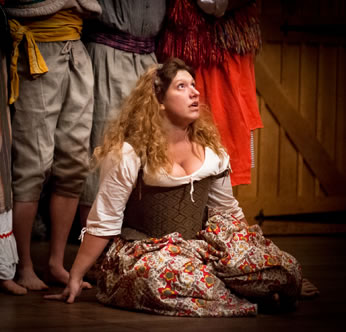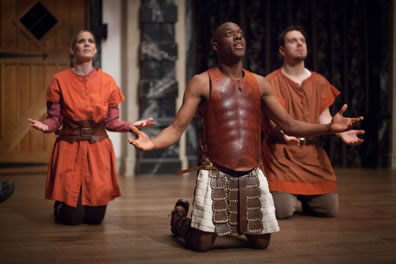The Two Noble Kinsmen
This Is Some Seriously Crazy Stuff, Man
American Shakespeare Center, Blackfriars Playhouse, Staunton, Va.
Friday, March 15, 2013, C-6&7 (center stalls)
Actors’ Renaissance Season

The mad Jailer's Daughter (Allison Glenzer) ends up on the floor at the end of the Morris Dance presented by the country folk to Theseus and Hippolyta in the American Shakespeare Center's production of The Two Noble Kinsmen at the Blackfriars Playhouse. Photo by Lauren D. Rogers, American Shakespeare Center.
Polonius in Hamlet describes the troupe of players as "The best actors in the world, either for tragedy, comedy, history, pastoral, pastoral-comical, historical-pastoral, tragical-historical, tragical-comical-historical-pastoral…" That last descriptor, the passage's punchline, is exactly what William Shakespeare and John Fletcher have given us with The Two Noble Kinsmen.
Such a challenging play is made more so under the dictates of the American Shakespeare's Center's Actors' Renaissance Season during which a company of 12 actors mount five plays—this one being the last to join the repertoire—with no director, a few days of rehearsal for each title, and the actors using only their individual parts' cue scripts.
That last is a key point. Two Noble Kinsmen is a play that barely makes sense as a whole. Here's a brief summation. Athen's Duke Theseus and Amazon Queen Hippolyta, in their wedding procession, are waylaid by three queens who beg Theseus to wage war on Thebes, where their dead husbands lie unburied after a previous battle. Theseus does and takes prisoner two wounded Theban knights, cousins and best buds Arcite and Palamon. From their jail cell's window, they spy Hippolyta's sister, Emilia. Both instantly fall in love and become rivals. Arcite is paroled and banished but returns to Athens disguised to serve Emilia. The Jailer's Daughter, crushing on Palamon, helps him escape, whereupon he encounters Arcite, who gets him food, drink, clothes, and armor so the two can fight to the death. Theseus comes upon them and orders their execution, but Emilia, at Hippolyta's urging, begs him to let them live. He "shows mercy" by having them procure three other knights apiece for a big fight (this production gives them two apiece): The winning kinsman gets to marry Emilia while the loser and his allied knights lose their heads. Team Arcite wins, but afterward a horse Arcite is riding throws him, and on his dying breath he bequeaths Emilia to Palamon. All the while, the Jailer's Daughter goes mad.
Don't ask what the two allied knights of the winning team get; that's a superfluous point for Shakespeare and Fletcher, the least onerous of many plot threads they leave untied.
Any of this sound familiar? The Two Noble Kinsmen is a mashup of The Two Gentlemen of Verona (two buddies, fighting over a girl, one of them abandoning another girl to do so), A Midsummer Night's Dream (Theseus and Hippolyta and the Athenian woods), Hamlet (daughter with mental illness and description of said insane daughter playing with flowers by "the flood"), As You Like It (the character of Hymen), Love's Labour's Lost (country bumpkins under the direction of a pompous schoolmaster performing a show for the royals), Measure for Measure (a jail with a benevolent jailer), Pericles (pageantry of knights), and Cymbeline (special effects courtesy of the gods). A director can point this play anywhere along the comedy-to-tragedy spectrum; some elements are so ridiculous the play lends itself to farce, but the fates of Emilia and the Jailer's Daughter seem too tragic to take lightly.
So, what's a company of 12 individuals under no central direction to do? They have to figure out characters who lack consistency, clarity, and good judgment—except the Jailer's Daughter, who is just crazy—and cobble them together into a prevailing tone.
It turns out the Jailer's Daughter, played by Allison Glenzer, holds a more important key than the one that sets Palamon free; she doesn't just set the tone for this production, she sets the standard of walking a path weaving through comedy and tragedy. Her first appearance is of a happy 18-year-old girl, friendly to her Wooer (Chris Johnston), respectful and loving to her father (John Harrell), but the two noble knights in her dad's jail, especially Palamon, make her something of a Bielieber. "It is a holiday to look on them. Lord, the difference of men!" she says, a line Glenzer roars lustily. She's giggly giddy in the soliloquy she gives after she helps Palamon escape. In her next soliloquy, after Palamon has gone missing from their appointed rendezvous point, she is frightened—by the dark night in the woods, by the howling wolves, by the growing awareness of what could happen to her dad, by the realization that Palamon might have been eaten by the wolves or, worse, abandoned her. On her third soliloquy, she's gone over the edge into insanity.
As a career-long advocate for people with disabilities, I'm usually among the first to condemn turning mental illness into fodder for comedy (though, in fact, humor is part of how I handle my own challenges with depression). But Glenzer's comedy is in the context of the play. The Jailer's Daughter encounters the bumpkin Morris Dancers and becomes one of their company. When she returns home, her family and friends don't want to cross her, so they all end up pretending to be on a ship (probably written by Fletcher, this scene is nevertheless among the best in the Shakespearean canon). To cure her, the doctor (Daniel Kennedy) prescribes that the Wooer should not only pretend to be Palamon but that he acquiesce to every desire the Jailer's Daughter expresses, even sex ("Whoa there, doctor!" says her father).
Glenzer's mad antics inspire astonishment in the other characters and laughter in us (and astonishment, too, at her courageous performance); but they come from a place of deep—and dark—honesty. Glenzer weaves the yarns of her many considerable talents into this one role: we've seen her as bawdy clowns, lusty women, despairing waiting women, and a defeated empress. The Jailer's Daughter is all of these. She also maximizes her experience with the Blackfriars playing space, where the audience sits on three sides and on stools on the side of the stage itself. She engages with individuals in her many soliloquies, involving them in the action, even eliciting spoken responses from them. When she describes "a piece of silver on the tip of your tongue" for the ferry over the River Styx, a woman, rapt in attention, sticks out her own tongue. With her first soliloquy—when she contemplates freeing Palamon, long before madness overtakes her—Glenzer earns exit applause. Every subsequent Jailer's Daughter scene likewise gets an ovation. Except the last, when she asks the Wooer, pretending to be Palamon, if they will sleep together; encouraged by the doctor, the Wooer says they will. "But you shall not hurt me…If you do, love, I'll cry," the Jailer's Daughter says, which Glenzer addresses half to the Wooer, half to the audience with such vulnerability that as she slips out the door you could have heard breathing—that is, if anyone in the audience had the presence of mind to move a muscle even to breathe.
What's most astounding about Glenzer's commanding performance as the Jailer's Daughter is how it rises above such a strong corps de excellence that makes up the rest of the company. Ronald Peet as Palamon and Grant Davis as Arcite manage to make the courtly-honorable but silly-behaving kinsmen enthralling characters, finding key comic readings even beyond their inherently funny "I saw her first" argument in the jail. René Thornton Jr. rounds out the thorny edges of Theseus, presenting him as a ruler who sees his steady, no-nonsense course of action constantly knocked askew by supplicating women. Speaking of which, the first hurdle any production of Two Noble Kinsmen must o'erleap comes in the first few minutes when the high-pageantry wedding procession is interrupted by the sudden appearance of the three widow queens, bowing to Theseus speaking formal verses of supplication. This huh? moment turns electric with Tracie Thomason's delivery of the first queen's speech, followed by Glenzer and Kennedy playing the second and third queens, respectively.

Palamon (Ronald Peet, forefront) and his fellow knights (Tracie Thomason, left, and Benjamin Curns) pray to the god Venus before the big battle with Team Arcite over the right to marry Emilia in The Two Noble Kinsmen at the Blackrfiars Playhouse. Photo by Lauren D. Rogers, American Shakespeare Center.
On paper, Hippolyta is not much to imagine, but on this stage Sarah Fallon forms a richly detailed character, a onetime warrior now predisposed to loving this great lord while guiding her kid sister through life. The actress playing that kid sister, though, has the toughest path to travel. At various intersections, Emilia seems to be a lesbian, seems to have taken a vow of chastity, and seems to be a hot-for-guys girl. True to the precepts of the Actors' Renaissance Season production process, Abbi Hawk plays to the lines provided. This inevitably makes for an uneven rendering leading up to the soliloquy in which she can't decide between the portraits of Palamon and Arcite, a piece Hawk performs as delightful comedy descending into frustration at being thrust into having to make such a decision in the first place. Hawk wisely uses the role's nonspeaking moments to reach the true turmoil this woman endures. When the royal company comes upon the two knights fighting over her, watch Emilia's reaction: These are two men she's never seen before, never even heard of, but because they are enflamed with lust for her, she must either condemn both to death or marry one and have the other killed. I know a lot of women who would profess that an easy choice, but I doubt few would be willing to make it on the spot. After the final battle and through Arcite's death, Hawk's Emilia seems resigned to a fate she has no control over; at the end she at least has hope that Palamon will remain good and true to her, if not for her sake than out of fealty to the memory of his dead friend.
The Wooer might be the play's most consistent character, ever showing affection and honest care for the Jailer's Daughter. Johnston presents him as something of a village idiot; one could argue too much so, as it presents a stark a comparison between him and Palamon. Still, even in his stupid clown mode, Johnston delivers his description of encountering the Jailer's Daughter by the lake with vocal wings that carry this beautiful passage to a state of poetic heaven.
However, Johnston's real star turn comes before the play starts. Benjamin Curns, who plays various roles in the play, starting with Hymen, appears as a ventriloquist carrying Johnston as his dummy. The two do the preplay speech—the welcome, no-photos-and-cell-phones, here's-what-the-Blackfriars-is-all-about, please-donate spiel—as a hilarious comic sketch. This bit seems, at the time, to be setting us up for a night of hilarity. In fact, it's a preview not of the tragical-comical-historical-pastoral about to be played, but the "best actors in the world" about to play it.
Eric Minton
March 18, 2013
This review also appears on PlayShakespeare.com
Comment: e-mail [email protected].
Start a discussion in the Bardroom



 Find additional Shakespeareances
Find additional Shakespeareances